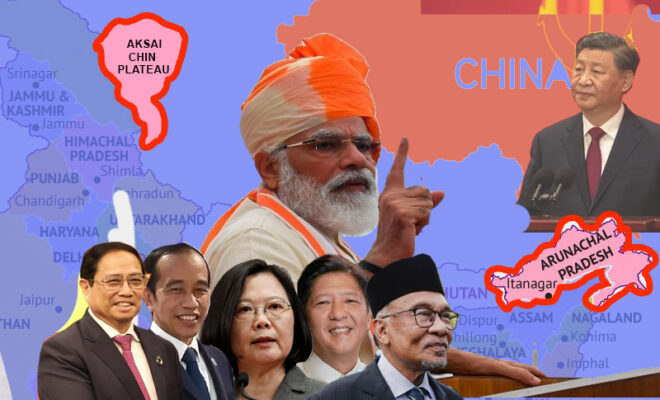After India, 5 More Countries Slammed China Over Its New Map

China’s release of a new map (China’s Standard Map) in 2023 asserting territorial claims over various regions has led to strong objections from several Asia Pacific countries, including India, the Philippines, Malaysia, Taiwan, Indonesia and Vietnam.
India has vehemently rejected China’s fake claims over the Indian state of Arunachal Pradesh and the Aksai Chin plateau, stating that these claims have no basis and only complicate existing boundary disputes.
India emphasizes that it will not compromise on its territorial integrity and is ready to take measures against China’s invalid standard map.
Taiwan has also rejected China’s map, which portrays Taiwan as part of China. Taiwan, officially the Republic of China, is a sovereign and independent country recognized by the international community.
The Taiwanese government emphasized that no matter how China distorts its claim to Taiwan’s sovereignty, it cannot change the objective fact of Taiwan’s existence.
Later Malaysia also lodged a protest against China’s map, stating that it holds no binding authority over Malaysia.
Malaysia rejected any foreign claims to its maritime area based on China’s map and emphasized that the South China Sea is a complex and sensitive matter.
Malaysia’s claims in the South China Sea are based on international law, and it will not compromise on its sovereign rights.
The Philippines strongly objected to China’s new map, which includes the ten-dashed line in their territory.
The Philippines emphasized that China’s attempts to legitimize its sovereignty and jurisdiction have no basis under international law, particularly the 1982 United Nations Convention on the Law of the Sea (UNCLOS).
The Philippines called on China to act responsibly and adhere to its obligations under UNCLOS and the 2016 Arbitral Award, which invalidated China’s previous claims.
China’s release of this new map has heightened tensions in the Asia Pacific region, particularly in the South China Sea and along the Sino-Indian border.
These actions are seen as part of China’s continued assertiveness in asserting territorial claims and have prompted strong responses from the affected countries.
Also Read:- HAL, GE To Produce Fighter Jet Engines For Indian Air Force
China’s claims in these areas are met with skepticism and rejection by its neighbors, who rely on international law and agreements to defend their own claims and sovereignty.
China’s claims over the Indian regions of Arunachal Pradesh, Aksai Chin plateau, South China Sea and other disputed regions, have raised concerns and objections from various countries. These claims by China are seen as problematic for several reasons.
First, China’s claims are not supported by international law or the consensus of the international community. In the case of Arunachal Pradesh, these claims are based on historical inaccuracies and are not recognized as valid by the international community.
Second, these regions hold strategic importance. For example, Arunachal Pradesh shares borders with China, Myanmar, and Bhutan and is home to the Brahmaputra River, a vital water source for both India and China.
Additionally, Arunachal Pradesh is rich in natural resources like oil, gas, minerals, and timber. China’s attempts to assert control over these resources have been met with resistance from India.
China’s motivations behind these claims may also be linked to distracting from its own domestic challenges.
The country has been facing post-pandemic issues, banking crises, and boycotts of its products by several countries, among other crises.
By focusing on territorial disputes, China may be attempting to divert attention from these problems and rally support for its claims in other disputed areas like the South China Sea.
Whatever the reasons, these territorial claims pose a serious threat to the security and sovereignty of the affected countries.
India, in particular, has consistently rejected China’s claims and must continue to stand firm in defense of its territorial integrity. Finding a peaceful resolution to these disputes is essential for regional stability.



